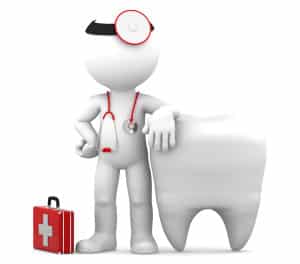
In most instances, it is best to address a dental emergency promptly by seeing your dentist. If after hours, you can call Smile Solutions on 13 13 96, or visit the Royal Melbourne Dental Hospital, both of which provide emergency dentistry. In some cases, prompt treatment will influence the potential success of treatment.
Here I describe the most common types of dental emergency and what to do in such cases.
Pain
If you have any type of dental pain it is best to book an appointment with a dentist to have this assessed. Mention to our receptionist that you have pain, the type of pain and where you believe it is coming from and your appointment will be prioritised and booked as soon as possible. In almost all cases, pain will be treated on the day.
If you are suffering dental pain outside of clinic hours, you can seek temporary relief by taking 2 ibuprofen (e.g. Nurofen) tablets every 2 to 3 hours alternating with 2 Panadol tablets every 2 to 3 hours until your appointment. If you are unsure whether you can take ibuprofen due to a health condition, or the sufferer is a child, check with your medical GP first. If the above dose is not enough to relieve the pain, alternate 2 Nurofen Plus tablets with 2 Panadol tablets every 2 to 3 hours until your appointment. Ensure that you eat something with each round of painkillers.
Trauma to the mouth or lost tooth
If you have suffered trauma to the teeth which has resulted in a lost tooth, a shifted/dislocated or a fractured tooth, it is important to book an appointment to have the situation assessed and treated by a dentist.
It is important to find and preserve the tooth. Rinse it briefly with water to remove any dirt. Store in a container of either saline or milk, not water, or moisten the tooth with saliva and wrap it in cling wrap to take to the dentist.
When a child loses a tooth, it is helpful to know if it is a baby tooth or an adult tooth. If a baby tooth, the dentist will not re-implant it, but if it is an adult tooth they probably will. If you are unsure, store as described above and the dentist will assess the tooth and determine the treatment required.
It is important that an appointment is made as soon as possible. Re-implanting the tooth within one hour of dislodgment promises the best treatment outcome. If a dental emergency of this kind arises after hours, you can seek emergency dentistry at the Royal Melbourne Dental Hospital to have the tooth re-implanted.
If the tooth has shifted, prompt treatment to reposition back to normal will improve the treatment outcome. To help the dentist work out the tooth’s original position, some photos of the patient’s usual smile might help.
Swollen gums or face
If you have noticed swelling of your gums or face relating to an unhealthy tooth, it is important to book an appointment as soon as possible to have this assessed and treated. Swelling of the face relating to tooth or gum infection can lead to closing of the airways and/or blood infections, both of which can be lethal in extreme cases. If you experience this kind of swelling after clinic hours, it is best to call Smile Solutions on 13 13 96 or present to Royal Melbourne Dental Hospital or any hospital’s emergency department.
Fractured or chipped tooth or filling
If you have fractured or chipped a tooth, you are advised to book an appointment to have this assessed to determine the treatment required. If you have been able to retain any piece that has broken off, it is a good idea to bring this to the appointment. If the fragment consists of tooth, place it in milk, saline or cling wrap with some saliva. If it consists of filling material or a crown, simply wrap it in cling wrap and bring to the appointment.
